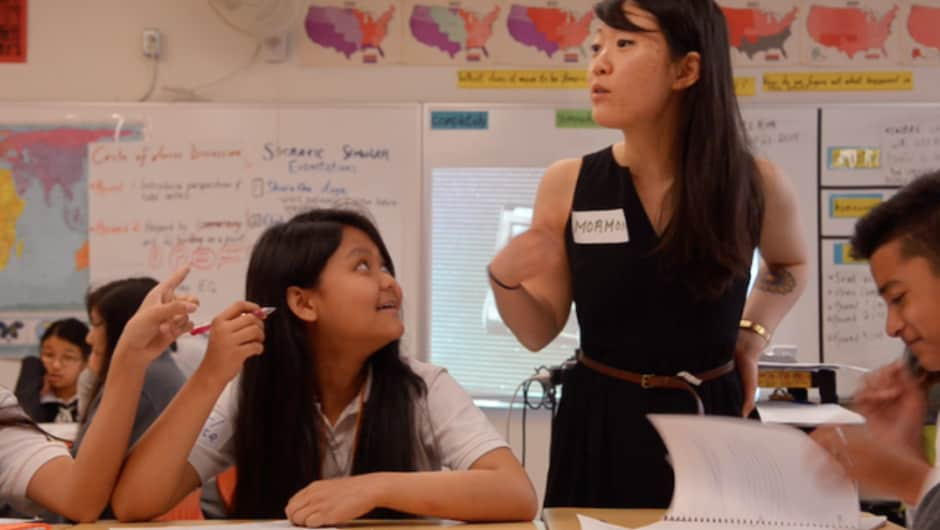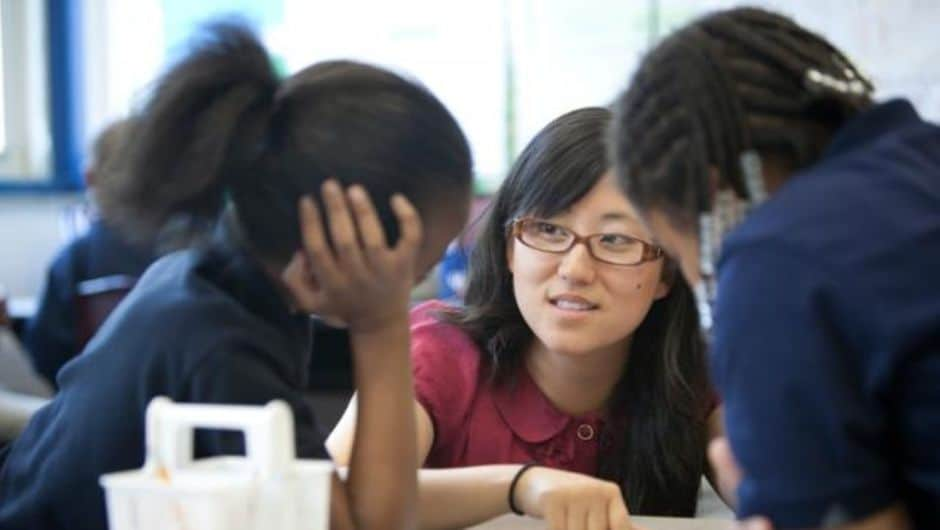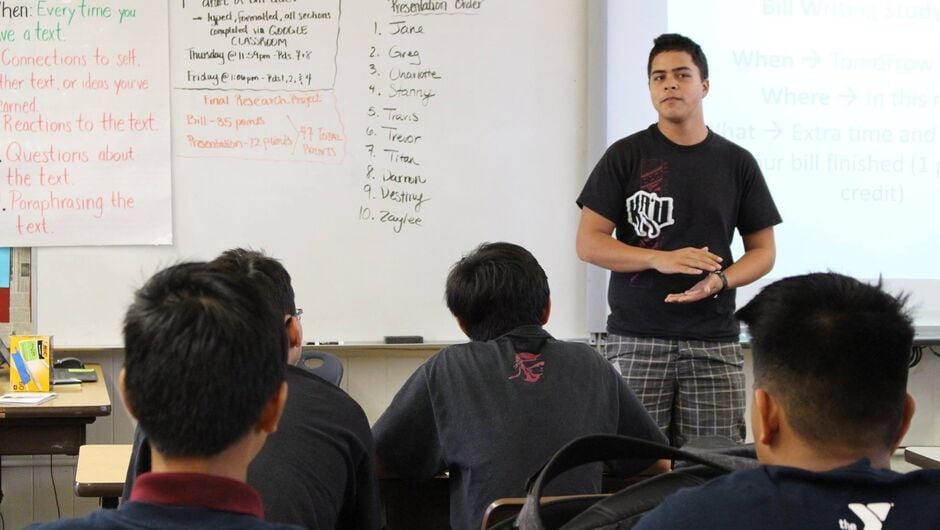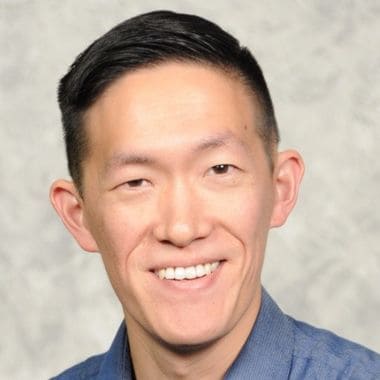Asian American & Pacific Islander Alliances
About the AAPI Alliances
The effort to end educational inequity must include the leadership of individuals who share similar backgrounds with the students most affected by the injustice, and led by those with personal proximity to the problem and its complexity. That's why we launched the Asian American and Pacific Islander (AAPI) Alliances in 2014. It's crucial we grow our base of Asian American, Native Hawaiian, and Pacific Islander (AANHPI) teachers in order to better reflect our nation's AANHPI students and anticipate the changing student demographics in our schools.
Teach For America’s AAPI Alliances works alongside organizations committed to deliver on the promise of equal opportunity for every child and help grow the leadership of AANHPI educators inside and outside of the classroom. Grounding ourselves in the long legacy of cross-racial and multi-ethic solidarity and struggle, we center in critical relationships. We are mobilizing a connected and culturally responsive AANHPI leadership coalition of educators, students, partners, collaborators, and co-conspirators who are committed to advocating around the critical issues most impacting AANHPI students.
The AAPI Alliance joined Act To Change, Hate Is A Virus, and Stop AAPI Hate at their second annual Changemakers Summit. Changemakers Summit 2022 is a national AAPI Youth Conference created in partnership with Act to Change and Hate Is A Virus. Designed to support, connect and develop the next generation of AAPI youth activists, the conference this year will center around the theme of Intergenerational & Intersectional Activism. Mina Fedor, of AAPI Youth Rising, interviewed Soukprida Phetmisy at their closing event on the topics of intergenerational organizing and maintaining self-care in activism. We aim to remove barriers on the pathway toward a child centric educational ecosystem in order to one day realize educational equity for all children.
Connect With Us
Stay in touch with our work and latest events. Connect with us on Facebook, Twitter, and Instagram for additional updates, or send us an email to get in touch.
Upcoming Events
We Are Not A Stereotype: Imagining Asian Education | SXSW EDU in Austin, TX
March 6-9, 2023
The AAPI Alliance is headed to SXSW EDU in March 2023! Soukprida Phetmisy, Senior Managing Director of the AAPI Alliances, will join Liz Kleinrock (Teach and Transform), Andrea Kim Neighbors (Smithsonian Asian Pacific American Center), and Vishavjit Singh (New York City Fire Department (FDNY)) for their workshop, We Are Not A Stereotype: Imagining Asian Education, which aims to shed light on the experiences of Asian American students and educators, and how to support and sustain Asian Americans through curriculum and pedagogy.
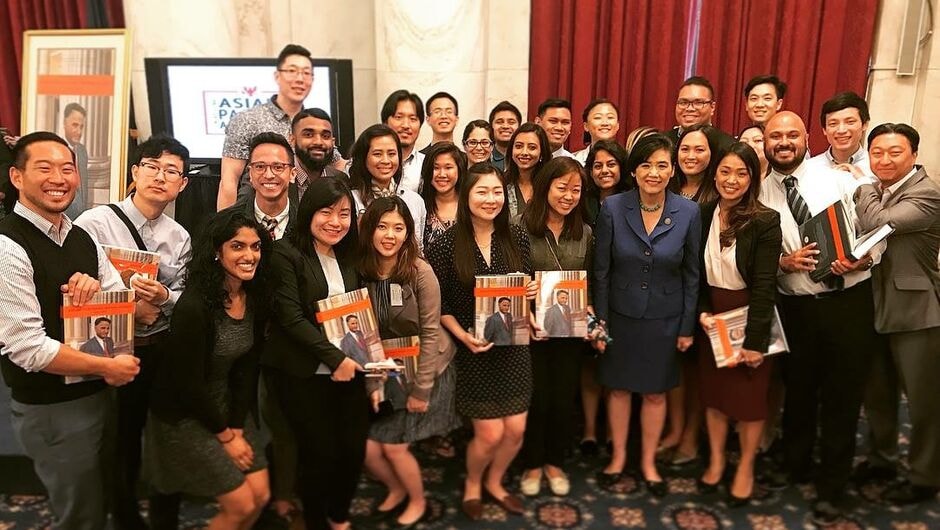
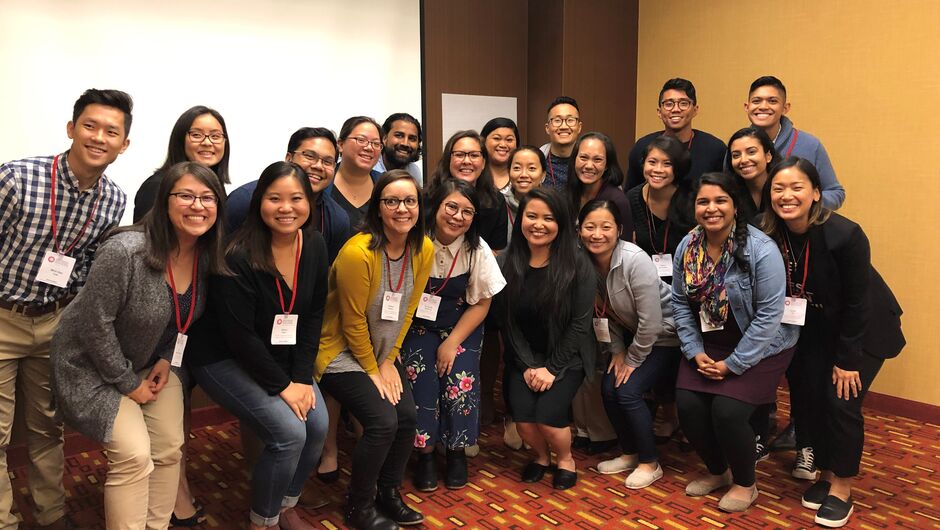
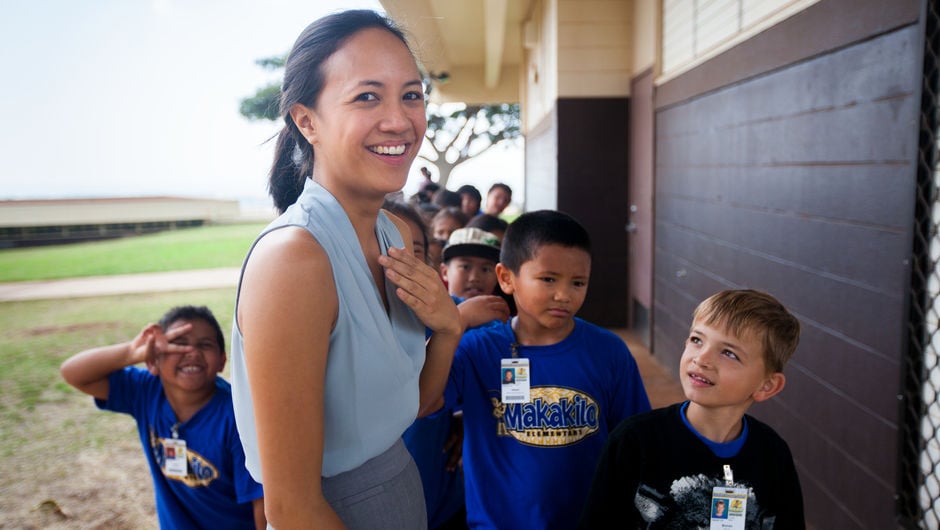
Our AANHPI community in action.
Why We Take A Stand
We’re committed to working in partnership with AANHPI leaders and organizations to recruit and train AANHPI teachers, raise awareness of the unique academic and socio-economic realities facing many AANHPI students, and expand opportunity for all children.
Moving Beyond Dispelling the "Model Minority Myth"
We work to raise awareness of the "model minority myth," the pervasive public perception that members of the AANHPI community are universally successful academically and economically secure. This stereotype harms AANHPI students who would otherwise benefit from programs and resources targeting vulnerable and underserved communities. Too often, AANHPI students are left out of national discourse around educational equity.
This harmful stereotype also masks the heterogeneity of the AANHPI community, the fastest-growing racial group in the United States. It consists of more than 48 ethnicities, over 300 spoken languages, varied socioeconomic statuses, and distinctions across immigration history, generational status, culture, and religion.
As a result, obtaining more data on AANHPI students (i.e. "data disaggregation") has become the primary civil rights issue in education for members of the AANHPI community. In 2014, Teach For America joined more than 180 national, state, and local organizations endorsing the federal All Students Count Act, calling for AAPI data disaggregation in K-12 public schools. Additionally, in 2017, TFA again advocated for stronger and more refined federal efforts in AAPI data collection and reporting, this time alongside nearly 250 other organizations, and today we remain part of the "All Students Count" coalition and continue to push for more accurate and specific data so as to better understand the needs of a diverse community and target resources more effectively. We currently work with local, state, and national partners to advocate for data disaggregation.
Here are some key statistics about the AANHPI community:
What We Do
Creating Safe Spaces in Schools
In the AANHPI community, bullying is often compounded by cultural, religious, and linguistic barriers that can keep AANHPI youth from seeking and receiving help. Anecdotal evidence has shown that certain AAPI groups – including South Asian, Muslim, Sikh, Micronesian, LGBTQ,immigrant, refugee, and limited English proficient youth – are more likely to be the targets of bullying.
Creating safe spaces for students is a priority at Teach For America, and we endeavor to support safe learning environments for all students. Teach For America is proud to join the diverse coalition of over 60 organizations supporting Act To Change, a public awareness campaign working to address bullying.
Read more about our resources for educators working with students in marginalized communities.
The following percentage of Asian American subgroups reported bullying in schools as a "very serious" problem, according to CAP and AAPI Data 2014:
- 42% Native Hawaiians & Pacific Islander
- 44% Vietnamese
- 45% Cambodian
- 46% Filipino
- 52% Indian
- 71% Hmong
According to statistics compiled by the federal government's AAPI Bullying Prevention Task Force:
- 67% of turbaned youth surveyed in Fresno, CA reported being bullied
- 50% of Asian American students in NYC public schools report “biased-based harassment"
- 87% of Sikh American students experience bullying to some degree at school
- 5-6x Bullied students were 5 to 6 times more likely to miss school than those who were not bullied
In The Community
We believe it’s crucial that we continue to advance conversations about educational equity in the AANHPI community. Students, schools, and the education system lose out on the lack of diversity in the education workforce. That's why we're committed to cultivating and building relationships and partnerships with AANHPI organizations to raise awareness about the most critical issues faced by AANHPI students and to collaborate on teacher recruitment, culturally competent teacher preparation and professional development, and leadership capacity building among leaders in our network.
Our partnerships and collaborations expand the leadership and professional development of Teach For America's AANHPI corps members, alumni, and staff to ensure that our organization is in greater service to students and the community. Together, we offer opportunities for corps members, alumni, and staff to grow their professional networks, participate in workshops and conferences, and build awareness, skills, and mindsets to impact their communities through local action.
DACA Recipients
Asian immigrants make up 16 percent of the 11 million undocumented immigrants in the United States. If you are brought to the U.S. as a child, you should be able to pursue an education and career without fear of deportation. This is why we’re committed to actively recruiting eligible individuals with Deferred Action for Childhood Arrivals (DACA) status to our teaching corps. About 12 percent of TFA corps members with DACA status identify as AANHPI. Read more about our support for DACA recipients and joining TFA as a DACA-protected corps member.
- 69% of Asian American and Pacific Islander students are foreign-born
- 11% of the 11 million undocumented immigrants in the U.S. are Asian American
“I am somebody that my students may not have otherwise encountered. Using my identity to enlighten my students about the variety of cultures that exist in the world and to break stereotypes has been so crucial to me.”
Meet Our AANHPI Leaders
About 30 years ago, there were a total of 15 Asian American and Pacific Islander corps members at Teach For America. Over the years, our leadership network has grown to nearly 4,000 leaders.
Although 6 percent of our student population identify as Asian American,Native Hawaiian, and Pacific islander (AANHPI), approximately
2.5 percent of our nation’s teachers identify as AANHPI. Teach For America (TFA) is the largest provider of AANHPI teachers in the United States, and 7 percent of our corps members identify as AANHPI - a number that more accurately reflects the diversity of our classrooms.
In 2020-2021, 415 AANHPI corps members were placed at 177 charter schools and 191 traditional public schools across the U.S.That year, TFA AANHPI educators reached 29,668 students at 368 schools.
Our corps members and alumni work in leadership positions across the private and public sector. We are teachers, school leaders, systems leaders, social entrepreneurs, policy, advocacy, and organizing leaders, and elected officials. Meet some of them below.
Elaine Dang
New Mexico '09
Engagement Manager
McKinsey & Company
Shaped by experiencing inequity as a student and corps member, Elaine now focuses on strategic and innovative consulting to help companies be more equitable and sustainable.
Kevin Fang, MD
Metro Atlanta '07
Community Medicine Fellow in Pediatrics
Fang works with the most vulnerable residents in the city of Los Angeles. As a fellow and the only LA-based pediatrician in Kaiser Permanente's highly regarded Community Medicine Fellowship Program, Fang divides his time between seeing patients at various federal and community clinics throughout Southern California and teaching in Kaiser's residency program.
Rupa Ramadurai
Miami-Dade '09
Senior Human Capital Consultant
IBIS Consulting Group
In Rupa Ramadurai's role as senior human capital consultant at IBIS Consulting Group, she helps organizations develop DEI hiring practices that promote equity.
Eric Kwak
Greater Chicago–Northwest Indiana '16
Public Policy Fellow
Alameda County Office of Education
Eric Kwak immigrated to the United States when he was eight years old and grew up in Koreatown, Los Angeles as an undocumented student. He attended the Los Angeles Unified School District and with the support and belief from his teachers, he went on to earn his B.S. in business administration at UC Berkeley. Eric Kwak is currently a Head Start teacher in the west side of Chicago. This past summer, he was a policy fellow at Ed-Trust West working on a district report card that measured achievement gaps using the newly designed CA Dashboard. He plans to use his experience growing up as a low-income student and as a teacher to better lives for disadvantaged students through policy.
Help us amplify AANHPI leadership and stories:
- Nominate someone for a spotlight on @aapitfa
- Lead a workshop or speak/panel at an AAPI Alliances or partner event
- Author an education equity issue op-ed for TFA.org
- Pitch a story for One Day Studio
Our Community Partners
Our partnerships are vital to building the capacity to mobilize a connected, thriving, culturally competent and community responsive leadership coalition working to advance educational equity for all children.
Teach for America's Partners
Learn more about our partners by choosing their logo from the selection below.
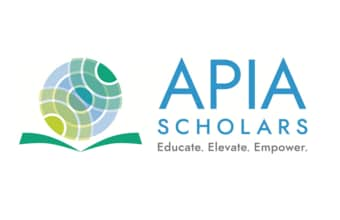
Asian & Pacific Islander American Scholars (APIA Scholars)
Asian & Pacific Islander American Scholars is the nation's largest non-profit provider of college scholarships for Asian and Pacific Islander Americans.
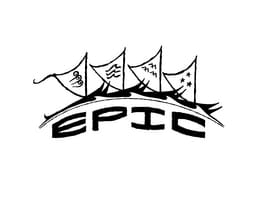
Empowering Pacific Islander Communities (EPIC)
Empowering Pacific Islander Communities (EPIC) advances social justice by engaging Native Hawaiian and Pacific Islander communities through culturally relevant advocacy, research, and development.
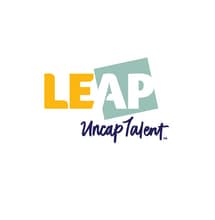
LEAP (Leadership Education for Asian Pacifics)
LEAP (Leadership Education for Asian Pacifics) is a national, nonprofit organization, with a mission to achieve full participation and equality for Asian and Pacific Islanders (APIs) through leadership, empowerment, and policy.
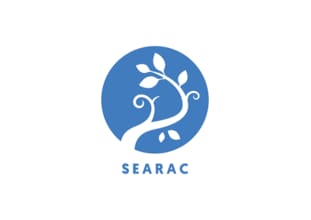
Southeast Asia Resource Action Center (SEARAC)
SEARAC is a national civil rights organization that empowers Cambodian, Laotian, and Vietnamese American communities to create a socially just and equitable society.
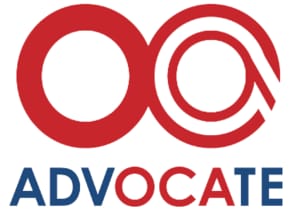
OCA-Asian American Advocates
Since 1973, OCA – Asian Pacific American Advocates has worked to advance the social, political, and economic well-being of AAPIs.
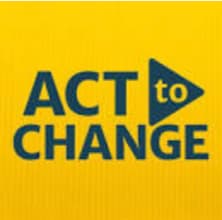
Act To Change
Act To Change is a national 501(c)(3) nonprofit organization working to address bullying, including in the Asian American and Pacific Islander (AAPI) community.
AANHPI Community Resources
We've compiled a list of resources to support teachers, students, professionals and other members of the AANHPI community.
Leadership Development and Scholarships
-
-
Scholarships, college and career readiness resources for Asian American, Native Hawaiian, and Pacific Islander students.
-
-
Coalition for Asian American Children & Families (CACF)
-
Leadership program for AANHPI youth in NYC.
-
-
National Korea American Service & Education Consortium (NAKASEC)
-
Youth empowerment programs.
-
-
Scholarship Opportunities for Asian and Pacific Islander American Students
-
Scholarships for Asian American, Native Hawaiian, and Pacific Islander students.
-
-
OCA Asian Pacific American Advocates
-
Scholarships and leadership development trainings for Asian Pacific American high school youth.
-
-
-
Leadership programs for K-12 students interested in science, nature, technology, art, design, history, culture, or all of the above.
-
Leadership Development
-
Asian Pacific American Institute for Congressional Studies (APAICS)
-
Paid summer internship for AANHPI college students.
-
-
Empowering Pacific Islander Communities (EPIC)
-
Culture-based and community-focused leadership empowering and development program for Pacific Islander college students.
-
-
Leadership Education for Asian Pacifics (LEAP)
-
Paid summer internship for AANHPI college students.
-
-
National Federation of Filipino American Associations (NaFFAA)
-
Leadership development and civic engagement program for Filipino American youth under the age of 30.
-
-
OCA Asian Pacific American Advocates
-
Leadership development trainings and internships for college students.
-
-
South Asian Americans Leading Together (SAALT)
-
Leadership development and civic engagement programs for the South Asian community.
-
Student Organizations
Resources for the Classroom & Schools
-
10 Things to Know about LGBTQ API Communities
-
Resources for supporting LGBTQ AANHPI communities.
-
-
-
K-12 Asian American booklist.
-
-
Asian American Racial Justice Toolkit
-
This toolkit represents the work and thinking of 15 grassroots organizations with Asian American bases living in the most precarious margins of power: low-income tenants, youth, undocumented immigrants, low-wage workers, refugees, women and girls, and queer and trans people. It reflects their experiences with criminalization, deportation, homophobia, xenophobia and Islamo-racism, war, gender violence, poverty, and worker exploitation.
-
-
Celebrating Asian and Pacific Islander Heritage
-
Lesson plans and acitivities celebrating Asian and Pacific Islander heritage from K-12.
-
-
-
K-12 Korematsu Institute Teacher's Guide, videos and accompanying lesson plans, and posters.
-
-
GLAAD Asian Pacific Islander Resource Kit
-
Resources for supporting LGBTQ AANHPI communities.
-
-
Japanese American Citizens League (JACL)
-
Curriculum guides and resources around the history of Japanese Americans and Asian Americans.
-
-
National Pacific Islander Education Network (NPIEN)
-
Teacher resources related to Pacific Islander communities.
-
-
National Queer Asian Pacific Islander Alliance
-
Resources for supporting LGBTQ AANHPI communities.
-
-
PFLAG Resources for API Families
-
Resources for supporting LGBTQ AANHPI communities.
-
-
Q&A Space: Stories from LGBTQ Asian and Pacific Islanders & Allies
-
Resources for supporting LGBTQ AANHPI communities.
-
-
Southeast Asia Resource Action Center (SEARAC)
-
Resources addressing issues that impact the Southeast Asian American community.
-
-
Smithsonian Education: Asian Pacific American Heritage Teaching Resources
-
Interactive platform for discovering millions of authentic digital resources, creating content with online tools, and sharing in the Smithsonian's expansive community of knowledge and learning.
-
-
-
Resources for educators who work with students in marginalized communities.
-
-
Teach For America Teaching Communities
-
Self-paced courses, expert teaching advice, and resources for teachers.
-
-
Teach For America Teacher Pinterest Board
-
Teaching resources, inspiration, self-care, and humor for teachers.
-
-
Teaching Tolerance Classroom Resources
-
Teaching Tolerance has a broad set of resources, toolkits, and professional development that can support corps members and alumni interested in advancing safe classrooms. You're encouraged to search its portal for more.
-
-
UCLA LGBT Resource Center Asian and Pacific Islander Resources
-
Resources for supporting LGBTQ AANHPI communities.
-
-
Untold Civil Rights Stories and Common Core Lesson Plans
-
Curricular resources by subject or by grade to identify and honor those individuals of Asian descent who were, and are, heroes in the struggle for civil rights and social justice.
-
Leadership Development
-
Asian Pacific Americans in Higher Education (APAHE)
-
Leadership and professional development conference addressing Asian Pacific American concerns and issues in higher education.
-
-
Japanese American Citizens League (JACL)
-
Teacher training workshops around the Japanese Amerian Incarceration.
-
-
National Pacific Islander Education Network (NPIEN)
-
Pacific Islander education conference.
-
-
Native Alliance Corps Member Leadership Summit
-
Leadership development summit for corps members, alumni and staff who identify as American Indian, Alaska Native, Native Hawaiian and Indigenous Native.
-
-
Teaching Tolerance Professional Development
-
Teaching Tolerance has a broad set of resources, toolkits, and professional development that can support corps members and alumni interested in advancing safe classrooms. You're encouraged to search its portal for more.
-
-
Asian American, Native Hawaiian, and Pacific Islander Corps Member Summit
-
Teach For America’s leadership development summit for corps members, alumni and staff who identify as Asian American, Native Hawaiian, and Pacific Islander.
-
-
Leadership for Educational Equity
-
Nonpartisan civic leadership development for leaders with classroom experience.
-
-
South Asian Americans Leading Together (SAALT)
-
Leadership development and civic engagement programs for the South Asian community.
-
Partner Resources for Educators
- Teach For America presents the AAPI Youth Rising ONE DAY OF AAPI HISTORY Lesson
- OCA-Asian Pacific American Advocates is leading a push for our nation’s schools to teach Asian American, Native Hawaiian, and Pacific Islander history. Learn more at the K-12 AANHPI Curriculum Project.
- Smithsonian APA launches an educational, We Are Not a Stereotype, video series breaking down Asian Pacific American bias for classroom teachers and caregivers who teach.
- AAPI Alliance partners with Make Noise Today to launch the Educational Toolkit. The Educational Toolkit includes 13 lessons split into 5 chapters with storytelling at its core. We can Make Noise Today by teaching young people to tell their own stories to counter the mainstream narrative.
- Act To Change publishes their first Asian American Bullying Survey Report in partnership with Next Shark and ADMERASIA which includes a resource for families on what to do when their child is bullied.
- What Does It Mean To Be An America | Developed by the Mineta Legacy Project in partnership with SPICE (Stanford Program on International and Cross-Cultural Education), this free educational curriculum offers six lessons for educators, high school students, and college students to examine what it means to be American.
Fellowships
Civic Engagement
-
Asian Pacific American Institute for Congressional Studies (APAICS)
-
Asian Pacific American Labor Alliance, AFL-CIO (APALA)
-
Fellowships, trainings, and mentorship programs for AANHPIs
-
-
Leadership for Educational Equity
-
Nonpartisan civic leadership development for leaders with classroom experience.
-
-
National Federation of Filipino American Associations (NaFFAA)
-
Leadership development and civic engagement program for Filipino American youth under the age of 30.
-
Partner Resources for Professional Development
Leadership Professional Development with our partners at Leadership Education for Asian Pacifics
- LEAP Impact | LEAP Impact: An American Express Leadership Academy is a three-part, eight-month program designed to develop Asian and Pacific Islander staff for future and current leadership and management roles in nonprofit organizations and increase the retention of those committed to working in the nonprofit sector.
- LEAP Advance | LEAP Advance: Leadership Development Program for Higher Education is an intensive four-day experience that enhances the professional development of Asian and Pacific Islanders and prepares college/university administrators, faculty and staff to move into positions of greater visibility and influence. The program is held in partnership with Asian Pacific Americans in Higher Education (APAHE).
- LEAP Exceed | The LEAP Exceed is anchored in ongoing, reinforced activities to promote behavioral change. The program’s goal is to increase the number of Asian and Pacific Islanders in executive management in Fortune 1000 corporations.
Leadership Development
-
Leadership Education for Asian Pacifics (LEAP)
-
Leadership development programs for AANHPIs across sectors.
-
-
National Association for Asian American Professionals (NAAAP)
-
OCA Asian Pacific American Advocates
-
Leadership development programs for AANHPI professionals.
-
-
South Asian Americans Leading Together (SAALT)
-
Leadership development and civic engagement programs for the South Asian community.
-
Other Opportunities
Volunteer with our partners at APIA Scholars and help expand their offering of eMentorships to APIA college students as part of their SMART program.
Annual Legislative Leadership Summit | Asian Pacific American Institute for Congressional Studies (APAICS)
- Tune in as subject matter experts, AA & NH/PI elected officials, community/corporate leaders, and more discuss various issues affecting our AA & NH/PIs and the nation at large.



